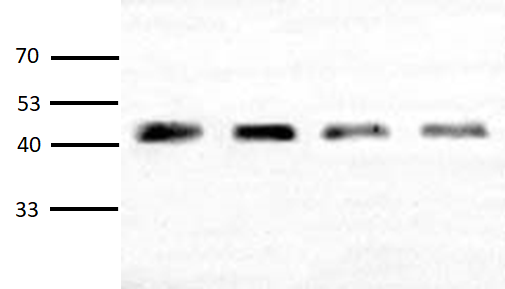| Product name | Anti-Plant Actin Mouse Monoclonal Antibody (3T3) |
| Immunogen | Recombinant Protein |
| Host | Mouse |
| Reactivity | Arabidopsis, Brassica napus, Corn |
| Applications | WB |
| Applications notes | Optimal working dilutions should be determined experimentally by the investigator. Suggested starting dilutions are as follows: WB (1:5000-1:10000). |
| Clonality | Monoclonal |
| Preparation method | The antibody was affinity-purified from mouse ascites by affinity-chromatography using specific immunogen |
| Alternative | AT3G12110; actin-11 |
| Formulation | Liquid solution |
| Storage buffer | Liquid in PBS, pH 7.4, containing 0.02% Sodium Azide as preservative and 50% Glycerol. |
| Storage instructions | Stable for one year at -20°C from date of shipment. For maximum recovery of product, centrifuge the original vial after thawing and prior to removing the cap. Aliquot to avoid repeated freezing and thawing. |
| Shipping | Gel pack with blue ice. |
| Precautions | The product listed herein is for research use only and is not intended for use in human or clinical diagnosis. Suggested applications of our products are not recommendations to use our products in violation of any patent or as a license. We cannot be responsible for patent infringements or other violations that may occur with the use of this product. |
| Background | Actin is a highly conserved protein and an essential component of cell cytoskeleton and plays an important role in cytoplasmic streaming, cell shape determination, cell division, organelle movement and extension growth. Preferentially expressed in young and expanding tissues, floral organ primordia, developing seeds and emerging inflorescence. Arabidopsis has a complex actin gene family that encodes six protein subclasses. One of the classes is represented by the proteins ACT2 and ACT8, which are similar proteins, but have different flanking sequences, introns and silent nucleotide positions in codons. ACT8 is expressed in root, stems, leaves, flowers, pollen and siliques. |
| Gene ID | 820385 |
| Alternative | AT3G12110; actin-11 |
| Accession | P53496 |
| Observed Band(KD) | 43 |

Fig. Western blot analysis of plant Actin expression in Arabidopsis (lane 1-4) with Anti-Plant Actin Mouse Monoclonal Antibody (3T3) (A01050, 1:2000) and HRP, Goat Anti-Mouse IgG (A21010, 1:10000).
Author:Guo, Jianping, et al. Publication name:Nature IF:64.8
Author:Guo J, Xu C, Wu D, et al Publication name:Nat Genet. 2018, 50(2): 297-306. IF:19.88
Author:Jiang, Leiyu, et al. Publication name:Plant Biotechnology Journal IF:13.8
Author: Publication name:Science Advances IF:13.6
Author:Yang, Dami, et al. Publication name:Journal of Integrative Plant Biology IF:11.4
Author:X Luo, T Tian, L Feng, X Yang, L Li, X Tan, W Wu Publication name:Journal of Advanced Research IF:10.7
Author:M Ma, SY Shen, C Bai, WQ Wang, XH Feng, JZ Ying Publication name:Cell Reports IF:8.8
Author:Yang, Yingying, et al. Publication name:Horticulture Research IF:8.7
Author:Jia‐Jia Han, Xiaoyuan Yang, et al Publication name:New Phytologist. (2018). IF:7.17
Author:Niu, Yajie, et al. Publication name:Ecotoxicology and Environmental Safety IF:6.8
Author:Jia-Jia Han, Xiaoyuan Yang, Qian Wang, et al Publication name:New Phytol. 2019 Feb;221(3):1359-1368. IF:6.65
Author:C Dong, R Li, N Wang, Y Liu, Y Zhang Publication name:Journal of Experimental Botany IF:5.908
Author:Li Y, Zhang L, Li D, et al Publication name:Plant, cell & environment, 2016, 39(3): 571-582. IF:5.65
Author:Mengru Zhang, Yanjuan Liu, Zhibin Liu, et al Publication name:Sci Rep. 2019 Feb 28;9(1):3032. IF:4.36
Author:H Zhang, X Tan, L Li, Y He, G Hong, J Li Publication name:Molecular plant pathology, 2019. IF:4.36
Author:H Zhang, X Tan, Y He, K Xie, L Li Publication name:Molecular plant pathology, 2019. IF:4.36
Author:Shenling Peng, Shengnan Huang, Zhiyong Liu and Hui Feng Publication name:Int J Mol Sci. 2019 May 10;20(9). pii: E2310. IF:4.32
Author:Xue Yang, Yuwen Lu, Xing Zhao, et al Publication name:Front Microbiol. 2019 May 8;10:1000. IF:4.3
Author:J Bi, Y Yang, B Chen, J Zhao, Z Chen, B Song Publication name:Front. Microbiol., 20 March 2019. IF:4.3
Author:Liu M, Khan N U, Wang N, et al Publication name:International Journal of Biological Sciences, 2016, 12(8): 931. IF:4.04
Author:Wu J, Deng W, Lin D, et al Publication name:J Agric Food Chem. 2018, 66(8): 1964-1973. IF:3.80
Author:H Wang, W Wang, J Zhan, W Huang, H Xu Publication name:Plant Cell, Tissue and Organ Culture (PCTOC), April 2019, Volume 137, Issue 1, pp 125–137. IF:2.53
Author:Hehong Zhang, Yuqing He, Xiaoxiang Tan, et al Publication name:Mol Plant Microbe Interact. 2019 Apr 15:MPMI10180285R. IF:/
You must be logged in to post a review.
Reviews
There are no reviews yet.